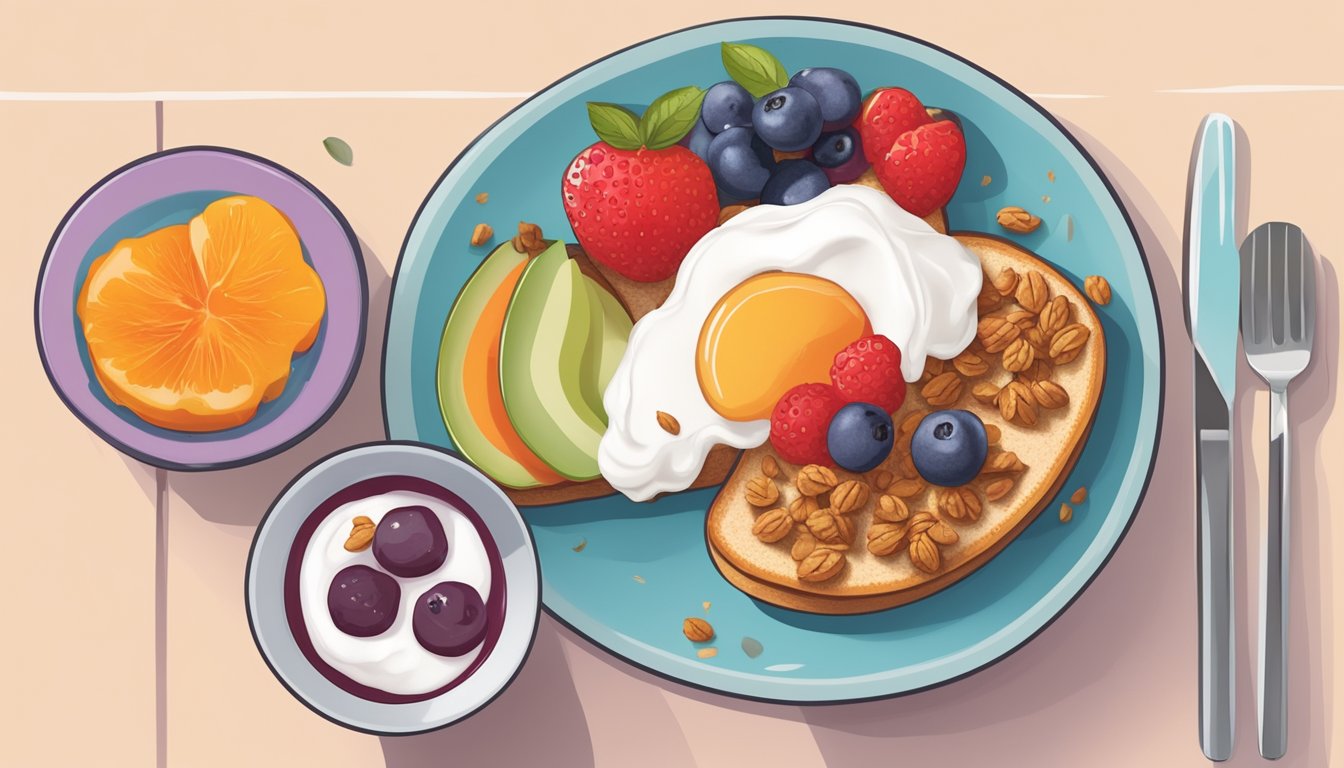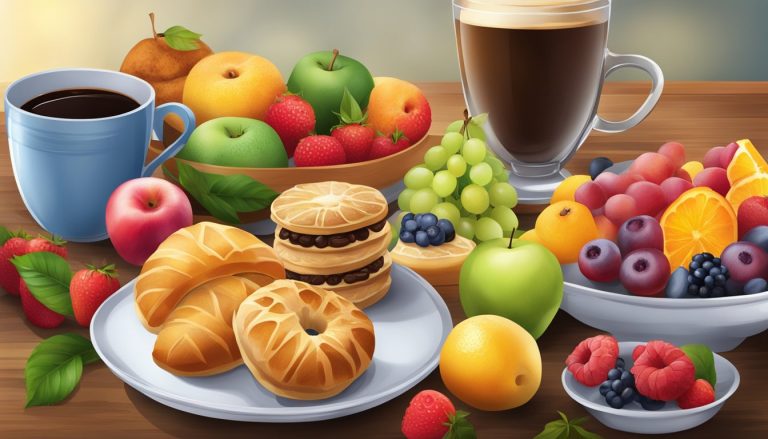Breakfast is a crucial meal for toddlers, setting the tone for their day and providing essential nutrients for growth and development. Many parents struggle to come up with nutritious and appealing options that their young children will actually eat. Variety is key to ensuring toddlers receive a balanced diet and develop healthy eating habits.
Discovering new breakfast ideas can make mornings easier and more enjoyable for both parents and toddlers. From quick and easy options to make-ahead meals, there are numerous ways to start the day off right. By exploring different recipes and food combinations, parents can find solutions that work for their family’s unique needs and preferences.
1) Avocado Toast Fingers
Avocado toast fingers are a nutritious and easy-to-handle breakfast option for toddlers. This simple dish combines the creamy texture of avocado with the crunch of toast, making it appealing to young palates.
To prepare, start by toasting a slice of whole grain bread until it’s crispy. Cut the toast into thin strips, about finger-width, to make it easier for small hands to grasp.
Mash a ripe avocado and spread it evenly over the toast strips. The avocado provides healthy fats and vitamins essential for a growing toddler’s development.
For added flavor and nutrition, sprinkle a pinch of salt or a squeeze of lemon juice over the avocado. Some parents opt to add thin slices of hard-boiled egg on top for extra protein.
Avocado toast fingers can be served as is or alongside other breakfast items like fresh fruit or yogurt. This versatile dish can be customized to suit a toddler’s preferences and introduces them to different textures and flavors.
2) Mini Banana Pancakes
Mini banana pancakes are a delightful breakfast option for toddlers. These bite-sized treats combine the natural sweetness of ripe bananas with a soft, fluffy texture that young children find appealing.
To create these pancakes, parents can use a simple batter made from mashed bananas, eggs, and flour. Some recipes incorporate self-rising flour for added fluffiness, while others use all-purpose flour with a touch of baking powder.
The miniature size of these pancakes makes them perfect for small hands to grip and eat independently. This encourages self-feeding skills and can make mealtime more enjoyable for toddlers.
Parents can customize these pancakes by adding fruit slices or berries on top before cooking. This not only enhances the nutritional value but also introduces different textures and flavors to the meal.
Leftover mini banana pancakes can be stored in the refrigerator for up to 5 days or frozen for longer-term storage. This makes them a convenient option for busy mornings or as a quick snack.
These pancakes are versatile and can be served warm or at room temperature. They pair well with various toppings such as yogurt, nut butter, or a light drizzle of maple syrup for added flavor.
3) Oatmeal Muffins
Oatmeal muffins are a nutritious and tasty breakfast option for toddlers. These muffins combine the wholesome goodness of oats with other ingredients to create a portable and satisfying meal.
Parents can easily customize oatmeal muffins to suit their toddler’s preferences. Adding mashed bananas, grated apples, or berries can enhance the flavor and nutritional value.
For a dairy-free version, vegetable oil or coconut oil can replace butter. Non-dairy milk alternatives work well in these recipes too. Gluten-free families can use gluten-free all-purpose flour as a substitute.
Oatmeal muffins are simple to prepare and can be made in advance. They store well at room temperature for up to three days or in the refrigerator for about a week.
Mini muffin tins are perfect for creating toddler-sized portions. Baking time should be adjusted to around 12-14 minutes for mini muffins.
These muffins offer a balanced mix of carbohydrates, fiber, and nutrients. They provide sustained energy for active toddlers throughout the morning.
4) Fruit and Yogurt Parfait
Fruit and yogurt parfaits offer a nutritious and appealing breakfast option for toddlers. These colorful layered creations combine creamy yogurt with fresh fruits and crunchy toppings.
To prepare a parfait, start with a base of plain or lightly sweetened yogurt. Greek yogurt provides extra protein, while regular yogurt offers a milder taste that many toddlers prefer.
Add a layer of diced fresh fruits like strawberries, blueberries, or peaches. Frozen fruits can also work well, especially when fresh options are limited.
Top the fruit layer with a sprinkle of granola or crushed whole-grain cereal for added texture and fiber. For a nut-free alternative, consider using seeds or coconut flakes.
Repeat the layers to create an visually attractive parfait. Serve in clear glasses or containers to showcase the colorful layers.
Parfaits can be customized to suit individual preferences. Let toddlers choose their favorite fruits and toppings to encourage involvement in meal preparation.
Prepare parfaits in advance and store them in the refrigerator for convenient grab-and-go breakfasts. This can save time during busy mornings while still providing a balanced meal.
5) Vegetable Omelette Bites

Vegetable omelette bites offer a nutritious and convenient breakfast option for toddlers. These bite-sized portions are easy for little hands to grasp and eat independently.
To prepare, parents can chop various vegetables like bell peppers, onions, and broccoli into small, uniform pieces. Mixing these with beaten eggs and a splash of milk creates a balanced and flavorful base.
Cooking the mixture in a non-stick pan over medium-low heat ensures even cooking. Once set, the omelette can be cut into small squares or fun shapes to appeal to toddlers.
For added nutrition, cheese can be sprinkled on top. This not only enhances the flavor but also provides additional calcium for growing bones.
Parents can customize the vegetable mix based on their toddler’s preferences. Pureed vegetables can be incorporated for picky eaters who may shy away from visible vegetable pieces.
These omelette bites can be made in advance and stored in the refrigerator. This makes them an excellent option for busy mornings or as a quick, healthy snack throughout the day.
6) Cottage Cheese with Berries
Cottage cheese with berries is a nutritious and simple breakfast option for toddlers. This protein-rich combination provides essential nutrients to start the day.
Cottage cheese offers calcium and protein, supporting bone health and growth. Berries add natural sweetness, fiber, and vitamins to the meal.
Choose a variety of berries such as strawberries, blueberries, or raspberries to create an appealing mix of colors and flavors. Cut larger berries into small, bite-sized pieces for easy eating.
Serve the cottage cheese in a small bowl and sprinkle the berries on top. For added texture, consider including a few whole grain crackers or toast strips on the side.
This breakfast can be prepared quickly, making it ideal for busy mornings. It’s also versatile, allowing for seasonal fruit variations throughout the year.
Cottage cheese with berries is suitable for toddlers 9 months and older. Always supervise young children during meals to ensure safe eating.
7) Mini Quinoa Patties

Mini quinoa patties offer a nutritious and tasty breakfast option for toddlers. These bite-sized treats combine cooked quinoa with vegetables and cheese, creating a flavorful and protein-rich meal.
To prepare, mix cooled quinoa with finely chopped vegetables like carrots, zucchini, or spinach. Add grated cheese and beaten eggs to bind the mixture. Form small patties and lightly pan-fry until golden brown.
These patties can be made in advance and stored in the refrigerator for up to five days. They also freeze well, lasting up to three months when properly stored. This makes them a convenient choice for busy mornings.
Serve mini quinoa patties warm or at room temperature. They pair well with a side of fruit or yogurt for a balanced breakfast. Toddlers can easily pick up and eat these patties with their hands, promoting independence during mealtime.
For added variety, experiment with different vegetables or herbs in the patties. This helps introduce new flavors to toddlers while maintaining a familiar texture and shape.
8) Whole Wheat Waffles
Whole wheat waffles offer a nutritious breakfast option for toddlers. These waffles provide essential nutrients and fiber from whole grain flour, making them a healthier alternative to refined flour versions.
Parents can easily prepare whole wheat waffles at home using simple ingredients. A basic recipe typically includes whole wheat flour, baking powder, baking soda, salt, eggs, milk, oil, and a touch of maple syrup for sweetness.
Toddlers often enjoy the crispy texture and grid pattern of waffles. Parents can make them more appealing by adding cinnamon or vanilla extract to the batter for extra flavor.
For added nutrition, consider incorporating mashed fruits like bananas or pureed vegetables into the waffle mix. This can boost the vitamin content and introduce new flavors to young palates.
Whole wheat waffles can be made in batches and stored for convenience. They keep well in the refrigerator for up to three days or in the freezer for several months. This allows for quick reheating on busy mornings.
Serving suggestions include topping waffles with fresh berries, yogurt, or a light drizzle of honey. These additions can make the meal more exciting for toddlers while providing additional nutrients.
9) Chia Seed Pudding
Chia seed pudding offers a nutritious and versatile breakfast option for toddlers. This simple dish combines chia seeds with milk, creating a pudding-like consistency as the seeds absorb the liquid.
Parents can customize the flavor by adding fruits, vanilla, or cocoa powder. Banana chia pudding is a popular choice, providing natural sweetness and additional nutrients.
For a smoother texture, blending the mixture creates a mousse-like consistency that many toddlers prefer. This approach also helps distribute the chia seeds evenly throughout the pudding.
Chia seeds are packed with fiber, protein, and omega-3 fatty acids, supporting healthy growth and development in young children. The pudding can be prepared in advance, making it a convenient breakfast option for busy mornings.
To make chia pudding faster, parents can use warm milk instead of cold, as chia seeds absorb warm liquid more quickly. This method reduces preparation time while maintaining the nutritional benefits.
10) Zucchini Bread
Zucchini bread offers a nutritious and tasty breakfast option for toddlers. This versatile treat combines the goodness of vegetables with the appeal of a sweet bread.
Many recipes incorporate grated zucchini, which adds moisture and nutrients without overwhelming flavor. Parents can easily customize zucchini bread to suit their toddler’s preferences.
Adding fruits like blueberries or bananas can enhance the natural sweetness. Some variations include carrots for extra vegetable content. Nuts, such as walnuts, can provide additional texture and nutrients.
Zucchini bread stores well, making it convenient for busy mornings. It can be kept at room temperature for a few days or refrigerated for up to a week. Freezing slices allows for longer storage and easy thawing.
Toasting slices of zucchini bread can create a warm, comforting breakfast. Spreading a thin layer of cream cheese or nut butter adds protein and makes it more filling for growing toddlers.
Nutritional Value in Toddler Breakfasts
A nutritious breakfast provides toddlers with essential nutrients and energy for growth, development, and daily activities. Balanced meals containing key vitamins, minerals, and macronutrients support a child’s physical and cognitive functions.
Importance of Balanced Meals
Balanced breakfasts help maintain stable blood sugar levels and provide sustained energy throughout the morning. A well-rounded meal should include protein, complex carbohydrates, healthy fats, and fruits or vegetables.
Protein sources like eggs, yogurt, or nut butters support muscle development and satiety. Whole grains offer fiber and B vitamins. Fruits and vegetables provide vitamins, minerals, and antioxidants.
Calcium-rich foods such as milk, yogurt, or fortified plant-based alternatives are crucial for bone health. Including a variety of nutrient-dense foods ensures toddlers receive a wide range of essential nutrients to support their rapid growth and development.
Nutrients for Growth and Development
Key nutrients for toddler growth include:
- Vitamin D: Supports bone health and immune function
- Iron: Essential for cognitive development and oxygen transport
- Omega-3 fatty acids: Important for brain development
- Fiber: Promotes digestive health and prevents constipation
Breakfast foods high in vitamin D include egg yolks and fortified cereals. Iron can be found in fortified cereals, nuts, and seeds. Omega-3s are present in chia seeds, flaxseeds, and fatty fish.
Offering a variety of colorful fruits and vegetables provides a range of vitamins and minerals. Whole grains supply B vitamins and fiber. Protein sources like eggs, Greek yogurt, or nut butters support muscle growth and repair.
Common Dietary Restrictions

Many toddlers have specific dietary needs that require careful consideration when planning breakfast. Parents often seek nutritious options that accommodate allergies and intolerances while still providing essential nutrients for growth and development.
Allergy-Friendly Breakfast Options
Egg-free breakfasts can include oatmeal made with dairy-free milk, topped with fresh fruit and seed butter. Chia seed pudding prepared overnight offers a protein-rich alternative. For nut allergies, sunflower seed butter on whole-grain toast provides healthy fats and protein.
Dairy-free options include coconut yogurt parfaits layered with berries and granola. Smoothies made with plant-based milk, spinach, and banana offer a nutrient-dense start to the day. Avocado toast sprinkled with hemp seeds serves as another dairy-free, protein-packed choice.
Gluten-Free Choices
Gluten-free pancakes made from almond or coconut flour are a popular option. These can be prepared in batches and frozen for quick weekday breakfasts. Quinoa porridge cooked in milk (dairy or plant-based) and flavored with cinnamon and diced apples provides a warm, filling meal.
Rice cakes topped with mashed banana and a drizzle of honey offer a simple, gluten-free alternative to toast. Omelettes or scrambled eggs with vegetables are naturally gluten-free and rich in protein. For a sweet treat, gluten-free muffins made with oat flour and studded with blueberries can be a nutritious breakfast option.
Tips for Encouraging Healthy Eating Habits

Establishing good eating habits in toddlers sets the foundation for lifelong nutrition. Focusing on variety and offering choices empowers children to make healthy decisions.
Incorporating Variety in Meals
Introduce a wide range of foods to expand your toddler’s palate. Offer different colors, textures, and flavors at each meal. Try serving at least one familiar food alongside new options to increase acceptance.
Present fruits and vegetables in various forms – raw, cooked, pureed, or as finger foods. Experiment with different preparation methods like roasting, steaming, or grilling to enhance flavors.
Rotate protein sources including lean meats, fish, eggs, legumes, and tofu. Incorporate whole grains such as quinoa, brown rice, and whole wheat pasta into meals.
Offering Choices to Toddlers
Give toddlers some control over their meals by offering limited choices. For example, ask “Would you like carrots or broccoli with dinner?” This encourages independence while ensuring nutritious options.
Create a “snack station” with pre-approved healthy items. Let your toddler choose from options like sliced fruit, yogurt cups, or whole grain crackers.
Allow children to serve themselves at mealtime when appropriate. Use child-sized utensils and small containers to make self-serving manageable.
Involve toddlers in meal planning and grocery shopping. Let them pick out a new fruit or vegetable to try each week. This builds excitement around healthy foods and encourages exploration.




